英语教研组总结发言稿
初中英语组教研发言稿(3篇)

第1篇大家好!我是初中英语教研组的成员,很荣幸能在这里与大家分享我们组的教学研发成果。
初中英语作为我国基础教育阶段的一门重要学科,对于培养学生的语言能力、思维能力以及跨文化交流能力具有重要意义。
近年来,我们教研组紧紧围绕新课标、新理念,积极开展教学研究,不断探索有效的教学方法,取得了显著成效。
以下是我代表初中英语教研组向大家汇报的工作。
一、深入学习新课标,明确教学目标新课标是指导我们教学的重要依据。
我们教研组高度重视新课标的学习,组织全体英语教师认真研读,确保每位教师都能准确把握新课标的精神实质。
通过学习,我们明确了初中英语教学的目标:培养学生具备扎实的英语基础,提高学生的听说读写能力,激发学生学习英语的兴趣,培养学生良好的学习习惯和自主学习能力,为学生的终身学习奠定基础。
二、优化教学设计,提高课堂教学效率1. 创设情境,激发兴趣兴趣是最好的老师。
我们教研组注重在课堂上创设真实、有趣的情境,激发学生学习英语的兴趣。
例如,在教授“Healthy Eating”这一课时,我们组织学生进行角色扮演,让学生在轻松愉快的氛围中学习单词和句型。
2. 重视听说训练,提高学生语言表达能力听说能力是英语学习的基础。
我们教研组注重听说训练,通过课堂活动、课后作业等多种形式,提高学生的听说能力。
例如,在教授“Travel”这一课时,我们组织学生进行英语对话、看图说话等活动,锻炼学生的口语表达能力。
3. 注重阅读教学,提升学生阅读素养阅读是英语学习的重要环节。
我们教研组注重阅读教学,通过精选课文、拓展阅读材料等方式,提升学生的阅读素养。
例如,在教授“My Family”这一课时,我们推荐学生阅读相关家庭主题的英文文章,拓展学生的知识面。
4. 加强写作训练,提高学生写作能力写作是英语学习的重要环节。
我们教研组注重写作训练,通过课堂讲解、课后作业等方式,提高学生的写作能力。
例如,在教授“Describe a person”这一课时,我们引导学生进行人物描写,锻炼学生的写作技巧。
英语教研活动总结讲话(3篇)
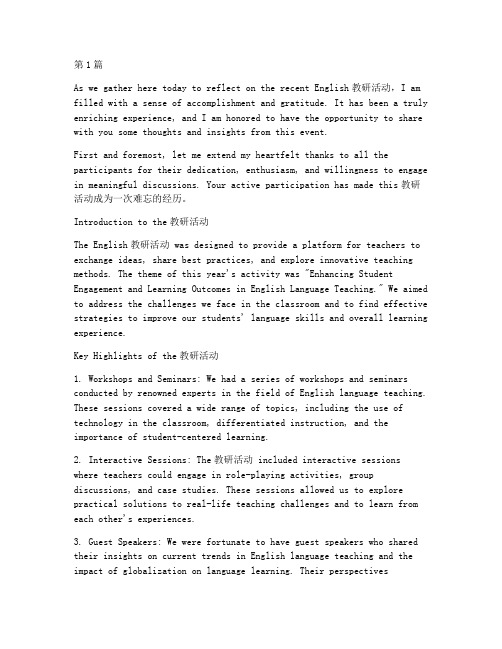
第1篇As we gather here today to reflect on the recent English教研活动,I am filled with a sense of accomplishment and gratitude. It has been a truly enriching experience, and I am honored to have the opportunity to share with you some thoughts and insights from this event.First and foremost, let me extend my heartfelt thanks to all the participants for their dedication, enthusiasm, and willingness to engage in meaningful discussions. Your active participation has made this教研活动成为一次难忘的经历。
Introduction to the教研活动The English教研活动 was designed to provide a platform for teachers to exchange ideas, share best practices, and explore innovative teaching methods. The theme of this year's activity was "Enhancing Student Engagement and Learning Outcomes in English Language Teaching." We aimed to address the challenges we face in the classroom and to find effective strategies to improve our students' language skills and overall learning experience.Key Highlights of the教研活动1. Workshops and Seminars: We had a series of workshops and seminars conducted by renowned experts in the field of English language teaching. These sessions covered a wide range of topics, including the use of technology in the classroom, differentiated instruction, and the importance of student-centered learning.2. Interactive Sessions: The教研活动 included interactive sessions where teachers could engage in role-playing activities, group discussions, and case studies. These sessions allowed us to explore practical solutions to real-life teaching challenges and to learn from each other's experiences.3. Guest Speakers: We were fortunate to have guest speakers who shared their insights on current trends in English language teaching and the impact of globalization on language learning. Their perspectivesprovided us with a broader context and a deeper understanding of the evolving landscape of language education.4. Networking Opportunities: The教研活动 provided a great opportunity for teachers to network and build professional relationships. Through these interactions, we were able to exchange contact information and explore potential collaborations in the future.Reflections on the Workshops and SeminarsThe workshops and seminars were particularly insightful. Here are some key takeaways from these sessions:- Technology Integration: We learned about the importance of integrating technology into our teaching practices. Tools such as interactive whiteboards, online learning platforms, and educational apps can significantly enhance student engagement and learning outcomes.- Differentiated Instruction: Recognizing that each student has unique learning needs, we discussed strategies for implementing differentiated instruction. This approach allows us to cater to the diverse abilities and learning styles of our students, thereby promoting a more inclusive classroom environment.- Student-Centered Learning: The focus on student-centered learning was a recurring theme throughout the seminars. We were encouraged to create a classroom atmosphere where students feel empowered to take ownership of their learning journey.Reflections on the Interactive SessionsThe interactive sessions were a highlight of the教研 activity. Here's what we gained from these sessions:- Practical Application: By engaging in role-playing and group discussions, we were able to put into practice the strategies and techniques we had learned. This hands-on approach helped us to better understand how to apply these methods in our own classrooms.- Collaborative Learning: The collaborative nature of these sessions allowed us to learn from each other's strengths and to support each other in our professional development.- Problem-Solving Skills: We were presented with various scenarios and challenges, which required us to think critically and creatively. This exercise helped us to enhance our problem-solving skills and to become more adaptable teachers.Reflections on the Guest SpeakersThe guest speakers provided us with invaluable insights into the current trends in English language teaching. Some of the key points they emphasized include:- Globalization: The increasing interconnectedness of the world has made English a global language. We need to ensure that our students are prepared for the challenges and opportunities that come with living in a multilingual and multicultural society.- Language Skills: While proficiency in reading, writing, speaking, and listening remains crucial, we also need to focus on critical thinking, problem-solving, and digital literacy skills.Conclusion and Moving ForwardIn conclusion, the English教研活动 has been a transformative experience for all of us. We have gained new knowledge, skills, and perspectives that will undoubtedly enhance our teaching practices and contribute to the academic success of our students.As we move forward, I encourage each of us to take the following actions:- Implement New Strategies: Begin integrating the new teachingstrategies and methods we have learned into our classrooms. Be open to experimentation and willing to adapt as we discover what works best for our students.- Share Knowledge: Communicate with our colleagues about the insights and experiences we have gained from the教研 activity. Let's create aculture of continuous learning and improvement within our school community.- Seek Professional Development: Stay informed about the latest trends and research in English language teaching. Attend workshops, seminars, and conferences to keep our skills and knowledge up to date.- Evaluate and Reflect: Regularly evaluate our teaching practices and reflect on our progress. Be open to feedback and willing to make necessary adjustments to ensure that we are providing the best possible education for our students.In closing, I want to reiterate my gratitude to all the participants for their dedication and commitment. Together, we have taken a significant step towards becoming better educators. Let us continue to support each other and strive for excellence in our teaching careers.Thank you for your attention, and I look forward to seeing the positive impact of this教研活动 in our classrooms.Yours sincerely,[Your Name][Your Position][Your Institution]第2篇It is with great pleasure that I stand before you today to deliver a summary of our recent English teaching and research activity. This activity, which lasted for a week, aimed to enhance our teaching skills, explore innovative teaching methods, and foster collaboration among us. It has been a fruitful and enlightening experience for all of us, and I am proud to share the highlights and outcomes with you.First and foremost, let us express our heartfelt gratitude to the organizers for their tireless efforts in making this activity a success. Their meticulous planning and dedication have provided us with an excellent platform for learning and growth. Additionally, we extend ourappreciation to all the participants who actively engaged in the discussions, shared their insights, and contributed to the overall success of the activity.The main objective of this English teaching and research activity was to upgrade our teaching methods and explore innovative approaches to enhance the quality of English education. We believe that continuous learning and professional development are crucial for us to keep up with the rapidly changing educational landscape. The following are some of the key highlights of the activity:1. Workshops and seminars: We organized a series of workshops and seminars on various topics, including classroom management, curriculum development, and innovative teaching techniques. These sessions were conducted by experts in the field, who shared their valuable experiences and insights. The participants found these sessions to be highly informative and beneficial, as they provided practical strategies that could be immediately implemented in their teaching practices.2. Collaborative learning: One of the highlights of the activity was the emphasis on collaborative learning. We encouraged the participants to work in groups and share their experiences, challenges, and successes. This collaborative approach allowed us to gain a deeper understanding of each other's perspectives and learn from each other's strengths. The discussions were lively and thought-provoking, leading to the generation of innovative ideas and solutions.3. Case studies and practical applications: To make the learning experience more tangible and relevant, we incorporated case studies and practical applications into the program. These case studies involvedreal-life scenarios that the participants could relate to, and they were asked to analyze and propose solutions. This hands-on approach enabled us to apply the theoretical knowledge we acquired in the workshops to real-world situations, thereby enhancing our problem-solving skills.4. Guest lectures: We invited renowned experts in the field of English education to deliver guest lectures. These lectures provided us with an opportunity to learn from the experiences of successful educators andresearchers. The guest speakers shared their insights on current trends in English education, emerging technologies, and effective teaching strategies. The participants found these lectures to be inspiring and motivating.5. Peer observations and feedback: To foster continuous improvement, we organized peer observations and feedback sessions. The participants were encouraged to observe each other's teaching sessions and provide constructive feedback. This approach not only helped us identify areas for improvement but also promoted a culture of mutual support and learning among us.6. Sharing of best practices: We recognized the importance of sharing best practices among colleagues. During the activity, we shared our successful teaching strategies, innovative approaches, and best practices with each other. This exchange of ideas and experiences enabled us to learn from each other and refine our teaching methods.In conclusion, the English teaching and research activity has been a valuable and enriching experience for all of us. It has provided us with a wealth of knowledge, practical skills, and innovative approaches that we can apply in our teaching practices. The following are some of the key takeaways from the activity:1. Continuous learning and professional development are essential for us to keep up with the rapidly changing educational landscape.2. Collaboration and peer support are crucial for our growth and development as educators.3. Innovative teaching methods and approaches can significantly enhance the quality of English education.4. Sharing of best practices and experiences among colleagues can lead to improved teaching and learning outcomes.5. Feedback and reflection are essential for continuous improvement in our teaching practices.As we move forward, we are committed to implementing the learnings and insights gained from this activity in our teaching practices. We will continue to strive for excellence in English education and contribute to the overall growth and development of our students.Once again, I would like to express my sincere gratitude to all the organizers, participants, and guest speakers for their contributions to the success of this activity. Let us continue to work together, support each other, and strive for excellence in English education.Thank you.第3篇It is with great pleasure and a sense of accomplishment that I stand before you today to deliver a summary of our recent English教研活动。
初中英语教研组总结发言稿
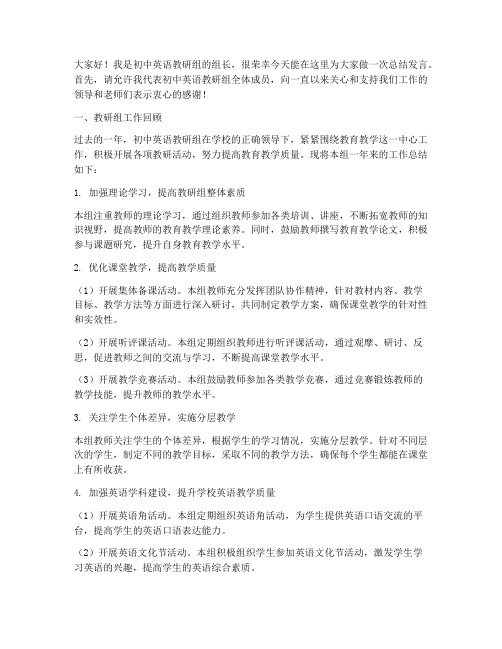
大家好!我是初中英语教研组的组长,很荣幸今天能在这里为大家做一次总结发言。
首先,请允许我代表初中英语教研组全体成员,向一直以来关心和支持我们工作的领导和老师们表示衷心的感谢!一、教研组工作回顾过去的一年,初中英语教研组在学校的正确领导下,紧紧围绕教育教学这一中心工作,积极开展各项教研活动,努力提高教育教学质量。
现将本组一年来的工作总结如下:1. 加强理论学习,提高教研组整体素质本组注重教师的理论学习,通过组织教师参加各类培训、讲座,不断拓宽教师的知识视野,提高教师的教育教学理论素养。
同时,鼓励教师撰写教育教学论文,积极参与课题研究,提升自身教育教学水平。
2. 优化课堂教学,提高教学质量(1)开展集体备课活动。
本组教师充分发挥团队协作精神,针对教材内容、教学目标、教学方法等方面进行深入研讨,共同制定教学方案,确保课堂教学的针对性和实效性。
(2)开展听评课活动。
本组定期组织教师进行听评课活动,通过观摩、研讨、反思,促进教师之间的交流与学习,不断提高课堂教学水平。
(3)开展教学竞赛活动。
本组鼓励教师参加各类教学竞赛,通过竞赛锻炼教师的教学技能,提升教师的教学水平。
3. 关注学生个体差异,实施分层教学本组教师关注学生的个体差异,根据学生的学习情况,实施分层教学。
针对不同层次的学生,制定不同的教学目标,采取不同的教学方法,确保每个学生都能在课堂上有所收获。
4. 加强英语学科建设,提升学校英语教学质量(1)开展英语角活动。
本组定期组织英语角活动,为学生提供英语口语交流的平台,提高学生的英语口语表达能力。
(2)开展英语文化节活动。
本组积极组织学生参加英语文化节活动,激发学生学习英语的兴趣,提高学生的英语综合素质。
(3)加强与外校的交流与合作。
本组积极与外校开展英语教学交流活动,借鉴先进的教学经验,提升我校英语教学质量。
二、教研组工作展望在新的一年里,初中英语教研组将继续努力,做好以下工作:1. 深入推进课程改革,创新教学方法本组将继续关注课程改革动态,积极探索新的教学方法,提高课堂教学效果。
小学英语教研活动发言稿(3篇)
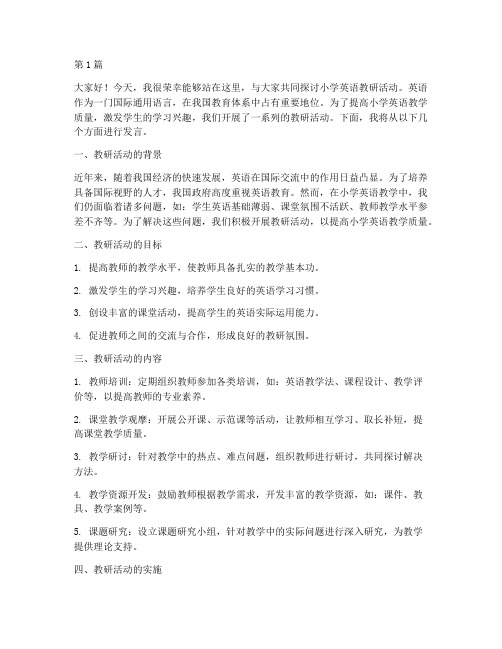
第1篇大家好!今天,我很荣幸能够站在这里,与大家共同探讨小学英语教研活动。
英语作为一门国际通用语言,在我国教育体系中占有重要地位。
为了提高小学英语教学质量,激发学生的学习兴趣,我们开展了一系列的教研活动。
下面,我将从以下几个方面进行发言。
一、教研活动的背景近年来,随着我国经济的快速发展,英语在国际交流中的作用日益凸显。
为了培养具备国际视野的人才,我国政府高度重视英语教育。
然而,在小学英语教学中,我们仍面临着诸多问题,如:学生英语基础薄弱、课堂氛围不活跃、教师教学水平参差不齐等。
为了解决这些问题,我们积极开展教研活动,以提高小学英语教学质量。
二、教研活动的目标1. 提高教师的教学水平,使教师具备扎实的教学基本功。
2. 激发学生的学习兴趣,培养学生良好的英语学习习惯。
3. 创设丰富的课堂活动,提高学生的英语实际运用能力。
4. 促进教师之间的交流与合作,形成良好的教研氛围。
三、教研活动的内容1. 教师培训:定期组织教师参加各类培训,如:英语教学法、课程设计、教学评价等,以提高教师的专业素养。
2. 课堂教学观摩:开展公开课、示范课等活动,让教师相互学习、取长补短,提高课堂教学质量。
3. 教学研讨:针对教学中的热点、难点问题,组织教师进行研讨,共同探讨解决方法。
4. 教学资源开发:鼓励教师根据教学需求,开发丰富的教学资源,如:课件、教具、教学案例等。
5. 课题研究:设立课题研究小组,针对教学中的实际问题进行深入研究,为教学提供理论支持。
四、教研活动的实施1. 制定详细的教研活动计划,明确活动时间、地点、内容等。
2. 组织教师积极参与教研活动,确保活动顺利进行。
3. 邀请专家、学者进行专题讲座,为教师提供学术支持。
4. 建立教研活动档案,对活动过程进行记录、总结。
5. 定期对教研活动进行评估,不断改进活动内容和方法。
五、教研活动的成果1. 教师的教学水平得到显著提高,课堂教学质量明显提升。
2. 学生的英语学习兴趣得到激发,学习效果显著。
英语教研会活动总结发言(3篇)
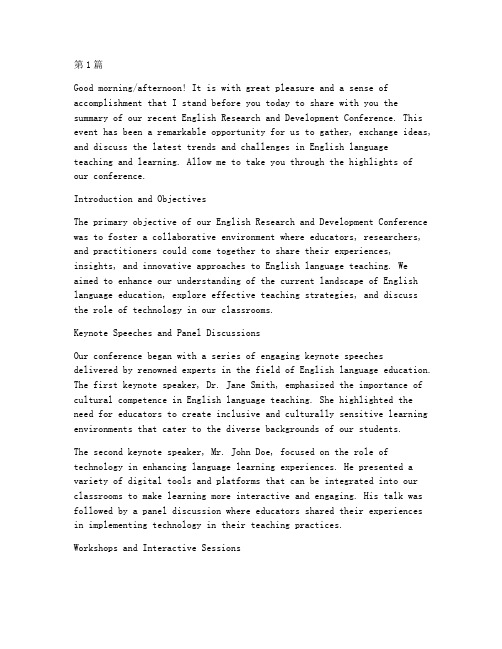
第1篇Good morning/afternoon! It is with great pleasure and a sense of accomplishment that I stand before you today to share with you the summary of our recent English Research and Development Conference. This event has been a remarkable opportunity for us to gather, exchange ideas, and discuss the latest trends and challenges in English languageteaching and learning. Allow me to take you through the highlights ofour conference.Introduction and ObjectivesThe primary objective of our English Research and Development Conference was to foster a collaborative environment where educators, researchers, and practitioners could come together to share their experiences, insights, and innovative approaches to English language teaching. We aimed to enhance our understanding of the current landscape of English language education, explore effective teaching strategies, and discuss the role of technology in our classrooms.Keynote Speeches and Panel DiscussionsOur conference began with a series of engaging keynote speechesdelivered by renowned experts in the field of English language education. The first keynote speaker, Dr. Jane Smith, emphasized the importance of cultural competence in English language teaching. She highlighted the need for educators to create inclusive and culturally sensitive learning environments that cater to the diverse backgrounds of our students.The second keynote speaker, Mr. John Doe, focused on the role of technology in enhancing language learning experiences. He presented a variety of digital tools and platforms that can be integrated into our classrooms to make learning more interactive and engaging. His talk was followed by a panel discussion where educators shared their experiencesin implementing technology in their teaching practices.Workshops and Interactive SessionsTo provide practical insights and hands-on experience, we organized a series of workshops and interactive sessions. These sessions covered a wide range of topics, including:1. Fluency and Pronunciation: A workshop on effective techniques to improve fluency and pronunciation in English language learners.2. Task-Based Language Teaching: A session on how to design and implement task-based language teaching activities that promote student engagement and critical thinking.3. Assessment and Feedback: A workshop on the importance of formative and summative assessment in monitoring student progress and providing constructive feedback.4. Inclusive Education: A session on creating inclusive classrooms that cater to the needs of students with diverse learning styles and abilities.The interactive nature of these sessions allowed participants to engage in meaningful discussions, share best practices, and learn from each other's experiences.Research PresentationsSeveral research presentations were delivered during the conference, showcasing the latest findings in English language education. These presentations covered a variety of topics, such as:1. The Effectiveness of Blended Learning: A study that investigated the impact of blended learning on the language proficiency of secondary school students.2. The Role of Technology in Second Language Acquisition: A research paper that explored how technology can facilitate second language acquisition among adult learners.3. Cultural Identity and Language Learning: A presentation on the relationship between cultural identity and language learning, with a focus on the experiences of immigrant students.The research presentations provided valuable insights into the latest trends and challenges in English language education, and sparked lively discussions among participants.Closing Remarks and Future DirectionsAs we draw to the close of our conference, it is important to reflect on the key takeaways and identify future directions for our work in English language education. Here are some of the key points that emerged from our discussions:1. Cultural Competence: There is a growing need for educators to develop cultural competence to create inclusive and effective learning environments.2. Technology Integration: The integration of technology in English language teaching is crucial for enhancing student engagement and promoting autonomous learning.3. Research-Informed Practice: It is essential for educators to stay updated with the latest research findings and incorporate evidence-based practices into their teaching.4. Professional Development: Continuous professional development is essential for educators to keep up with the evolving landscape of English language education.In conclusion, our English Research and Development Conference has been a highly successful event, providing us with valuable insights and practical tools to enhance our teaching practices. I would like to extend my heartfelt gratitude to all the participants, speakers, and organizers for their dedication and contributions to the success of this conference.As we move forward, let us remember the importance of collaboration, innovation, and continuous improvement in our quest to provide the best possible English language education to our students. Together, we can make a significant impact on the lives of our learners and contribute to the field of English language education.Thank you for your attention, and I look forward to seeing you all at our next conference.[Your Name][Your Position][Your Institution]第2篇Good morning/afternoon/evening, everyone. It is my great pleasure to stand before you today to share with you the highlights and insights from our recent English Research and Development Conference. As educators and language enthusiasts, we have gathered here to discuss, learn, and grow together in our pursuit of excellence in English language education.The conference, which spanned over two days, was a resounding success, with a diverse array of topics covered, engaging presentations, and thought-provoking discussions. I would like to take this opportunity to summarize the key takeaways from the event and express my gratitude to all the participants for their invaluable contributions.I. Conference OverviewOur conference commenced with a warm welcome from the chairperson, who emphasized the importance of continuous professional development in the field of English language education. The opening address was followed by a series of keynote speeches from renowned experts in the field, including educators, linguists, and policymakers.II. Keynote Speeches1. Innovative Teaching Methods: The first keynote speaker, Dr. Jane Smith, highlighted the significance of adopting innovative teaching methods to cater to the diverse needs of our students. She emphasized the use of technology, project-based learning, and flipped classrooms as effective strategies to enhance student engagement and achievement.2. Assessment and Evaluation: Dr. John Doe, another esteemed keynote speaker, delved into the challenges and best practices of assessment and evaluation in English language education. He advocated for a moreholistic approach that includes formative and summative assessments, and suggested the use of performance-based assessments to measure student progress.3. Language Policy and Curriculum Development: Dr. Emily Brown, a leading linguist, discussed the role of language policy in shaping curriculum development. She emphasized the need for a balanced approach that considers both local and global contexts, and highlighted the importance of including indigenous languages in the curriculum.III. Workshops and Interactive SessionsThe conference featured a variety of workshops and interactive sessions that allowed participants to engage in hands-on learning experiences. Some of the notable sessions included:1. Teaching Grammar Through Context: This workshop focused on the importance of integrating grammar into real-life contexts, rather than teaching it in isolation. Participants were engaged in activities that encouraged them to think critically about grammar usage in different scenarios.2. Fluency Building Techniques: A group of language teachers sharedtheir experiences and techniques for building fluency in English, including the use of storytelling, speaking clubs, and collaborative projects.3. Inclusive Classroom Practices: This session explored ways to create an inclusive classroom environment that accommodates students with diverse learning needs. Participants discussed strategies for differentiation, collaboration, and student-centered learning.IV. Roundtable DiscussionsThe roundtable discussions were a highlight of the conference, providing a platform for participants to share their thoughts and experiences on a variety of topics. Some of the key issues discussed included:1. Challenges of Teaching English as a Second Language (ESL): Participants from different regions shared their insights into the challenges of teaching ESL, including cultural differences, language barriers, and student motivation.2. Professional Development for English Language Teachers: The importance of ongoing professional development was emphasized, with suggestions for training programs, mentorship opportunities, and access to resources.3. The Future of English Language Education: A lively debate on the future of English language education took place, with participants weighing the impact of globalization, technological advancements, and the evolving role of English in the world.V. ConclusionAs we conclude this English Research and Development Conference, I would like to extend my heartfelt thanks to all the speakers, facilitators, and participants for their dedication and commitment to the field of English language education. The knowledge, ideas, and inspiration shared during these two days will undoubtedly have a lasting impact on our teaching practices and the lives of our students.In closing, I would like to leave you with a few key points to ponder:1. Innovation is Key: As educators, we must embrace innovation and adapt to new teaching methods that engage our students and promote learning.2. Continuous Learning: Our professional development is a journey, not a destination. We must remain committed to continuous learning and growth.3. Collaboration is Essential: The success of our students depends on our collective efforts. Let us work together to create a more inclusive and effective English language education system.Thank you once again for your participation. I look forward to the day when we can gather again to share our experiences and further our quest for excellence in English language education.Wishing you all the best in your future endeavors.Thank you.第3篇Today, I am honored to stand before you to summarize the activities of our English Research Conference. As we all know, the conference was a great success, and it provided us with an excellent opportunity to share our experiences, exchange ideas, and discuss the future of English education.Firstly, let me express my sincere gratitude to all the organizers, speakers, and participants for their hard work and dedication. The success of the conference would not have been possible without their efforts.During the conference, we had the pleasure of hosting a series of engaging and informative sessions. The topics covered ranged from the latest research findings in English education to practical strategiesfor classroom teaching. Here are some key highlights:1. The Importance of English Language EducationThe opening session emphasized the significance of English language education in today's globalized world. Our esteemed speakers highlighted the fact that English has become the lingua franca of international communication, and it is essential for students to be proficient in the language to succeed in their future careers.2. Research Findings in English EducationSeveral research papers were presented during the conference, showcasing the latest findings in the field of English education. These papers covered a wide range of topics, including the effectiveness of technology in language learning, the role of assessment in improvingstudent performance, and the impact of cultural diversity on language acquisition.3. Innovative Teaching StrategiesThe conference provided us with a platform to discuss and share innovative teaching strategies that can enhance the learning experience of our students. Participants shared their experiences with flipped classrooms, project-based learning, and gamification, among other approaches.4. Teacher Development and Professional GrowthWe also focused on the importance of teacher development and professional growth. The conference featured workshops and seminars aimed at helping teachers improve their skills, stay updated with the latest trends in the field, and foster a culture of continuous learning within their schools.5. Cultural Exchange and CollaborationThe conference provided an excellent opportunity for educators from different parts of the world to come together and exchange ideas. We had the pleasure of hosting delegates from various countries, who shared their unique perspectives on English education and collaborated on projects aimed at improving the quality of language learning worldwide.Now, let's take a moment to reflect on the key takeaways from the conference:1. The need for continuous improvement in English language education: As the world continues to evolve, so does the demand for English proficiency. We must strive to improve the quality of our teaching and adapt to the changing needs of our students.2. The importance of technology in language learning: Technology has the potential to revolutionize language education. We should explore innovative ways to integrate technology into our classrooms and make learning more engaging and effective.3. The significance of teacher development: Teachers play a crucial role in shaping the future of our students. We must invest in their professional growth and provide them with the necessary resources and support to excel in their roles.4. The power of collaboration: By working together, we can achieve great things. We should continue to collaborate with educators from different parts of the world and share our knowledge and experiences.In conclusion, the English Research Conference has been a valuable event that has inspired us to think critically about the future of English education. As we move forward, let us remember the key takeaways from this conference and work together to create a brighter future for our students.I would like to take this opportunity to thank all the participants for their active participation and contributions. Your insights and ideas have been invaluable, and I am confident that we will continue to make strides in the field of English education.Once again, I would like to express my gratitude to all the organizers, speakers, and participants for making this conference a success. Let us carry forward the spirit of collaboration and innovation as we continue to shape the future of English education.Thank you.。
小学英语教研组总结发言稿
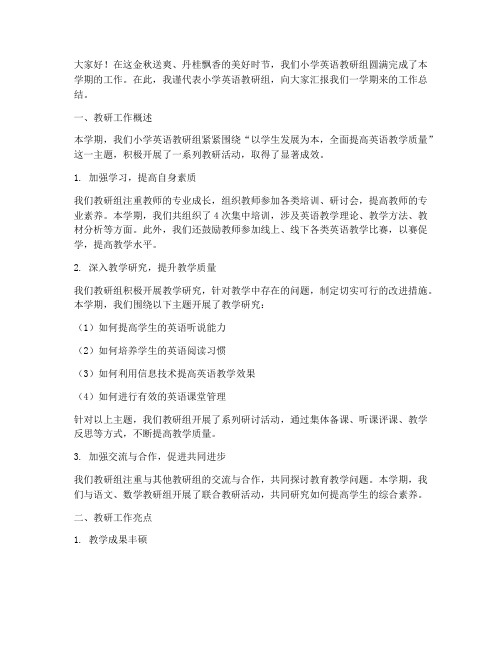
大家好!在这金秋送爽、丹桂飘香的美好时节,我们小学英语教研组圆满完成了本学期的工作。
在此,我谨代表小学英语教研组,向大家汇报我们一学期来的工作总结。
一、教研工作概述本学期,我们小学英语教研组紧紧围绕“以学生发展为本,全面提高英语教学质量”这一主题,积极开展了一系列教研活动,取得了显著成效。
1. 加强学习,提高自身素质我们教研组注重教师的专业成长,组织教师参加各类培训、研讨会,提高教师的专业素养。
本学期,我们共组织了4次集中培训,涉及英语教学理论、教学方法、教材分析等方面。
此外,我们还鼓励教师参加线上、线下各类英语教学比赛,以赛促学,提高教学水平。
2. 深入教学研究,提升教学质量我们教研组积极开展教学研究,针对教学中存在的问题,制定切实可行的改进措施。
本学期,我们围绕以下主题开展了教学研究:(1)如何提高学生的英语听说能力(2)如何培养学生的英语阅读习惯(3)如何利用信息技术提高英语教学效果(4)如何进行有效的英语课堂管理针对以上主题,我们教研组开展了系列研讨活动,通过集体备课、听课评课、教学反思等方式,不断提高教学质量。
3. 加强交流与合作,促进共同进步我们教研组注重与其他教研组的交流与合作,共同探讨教育教学问题。
本学期,我们与语文、数学教研组开展了联合教研活动,共同研究如何提高学生的综合素养。
二、教研工作亮点1. 教学成果丰硕本学期,我们教研组教师在各类教学比赛中取得了优异成绩。
在区级比赛中,我组教师共获得一等奖2名、二等奖3名、三等奖4名;在市级比赛中,我组教师共获得一等奖1名、二等奖2名、三等奖3名。
2. 学生英语水平显著提高通过本学期的教学,学生的英语听说读写能力得到了全面提升。
在期末考试中,我组学生英语成绩较上学期平均提高了10个百分点。
3. 教师专业素养不断提高本学期,我组教师积极参与各类培训,不断提升自身专业素养。
目前,我组教师已全部具备英语专业八级证书。
三、存在问题及改进措施1. 存在问题(1)部分教师对英语教学的认识不够深入,教学方法单一。
初中英语教研组总结发言(3篇)
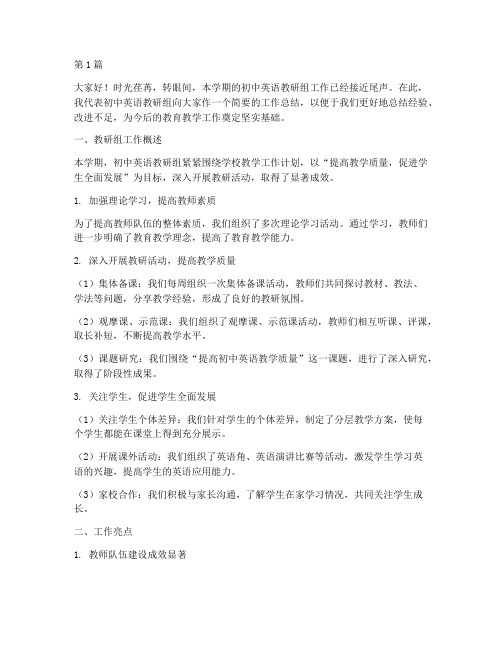
第1篇大家好!时光荏苒,转眼间,本学期的初中英语教研组工作已经接近尾声。
在此,我代表初中英语教研组向大家作一个简要的工作总结,以便于我们更好地总结经验、改进不足,为今后的教育教学工作奠定坚实基础。
一、教研组工作概述本学期,初中英语教研组紧紧围绕学校教学工作计划,以“提高教学质量,促进学生全面发展”为目标,深入开展教研活动,取得了显著成效。
1. 加强理论学习,提高教师素质为了提高教师队伍的整体素质,我们组织了多次理论学习活动。
通过学习,教师们进一步明确了教育教学理念,提高了教育教学能力。
2. 深入开展教研活动,提高教学质量(1)集体备课:我们每周组织一次集体备课活动,教师们共同探讨教材、教法、学法等问题,分享教学经验,形成了良好的教研氛围。
(2)观摩课、示范课:我们组织了观摩课、示范课活动,教师们相互听课、评课,取长补短,不断提高教学水平。
(3)课题研究:我们围绕“提高初中英语教学质量”这一课题,进行了深入研究,取得了阶段性成果。
3. 关注学生,促进学生全面发展(1)关注学生个体差异:我们针对学生的个体差异,制定了分层教学方案,使每个学生都能在课堂上得到充分展示。
(2)开展课外活动:我们组织了英语角、英语演讲比赛等活动,激发学生学习英语的兴趣,提高学生的英语应用能力。
(3)家校合作:我们积极与家长沟通,了解学生在家学习情况,共同关注学生成长。
二、工作亮点1. 教师队伍建设成效显著本学期,我们通过多种形式加强教师队伍建设,教师们教育教学能力得到了全面提升。
在各类教学比赛中,我校英语教师取得了优异成绩。
2. 教学质量稳步提高在全体英语教师的共同努力下,我校英语教学质量稳步提高。
学生在各级各类英语竞赛中取得了优异成绩。
3. 课题研究取得阶段性成果我们围绕“提高初中英语教学质量”这一课题,开展了深入研究,取得了阶段性成果。
部分研究成果已在全校范围内推广应用。
三、不足与改进措施1. 教师教学水平参差不齐部分教师教学经验不足,教学方法有待改进。
小学英语组教研活动发言(3篇)

第1篇今天,我们小学英语组聚集在这里,共同开展教研活动。
首先,请允许我代表英语组全体成员,对各位的到来表示热烈的欢迎和衷心的感谢。
本次教研活动的主题是“提升小学英语教学质量,促进学生全面发展”。
下面,我将从以下几个方面进行发言。
一、活动背景近年来,随着我国教育改革的不断深入,小学英语教育越来越受到重视。
作为小学英语教师,我们肩负着培养孩子们英语素养、提高他们国际视野的重要使命。
然而,在实际教学中,我们面临着诸多挑战,如教学方法单一、学生学习兴趣不高、教学效果不明显等。
为了解决这些问题,我们有必要开展教研活动,共同探讨有效的教学策略。
二、活动目的1. 提高英语教师的教学水平,促进教师之间的交流与合作。
2. 探索创新的教学方法,激发学生的学习兴趣,提高教学质量。
3. 培养学生的英语素养,为他们的全面发展奠定基础。
三、活动内容1. 课堂教学观摩本次教研活动,我们邀请了优秀教师进行课堂教学观摩。
通过观摩,我们可以学习他们的教学经验,了解他们的教学方法,为我们的教学提供借鉴。
2. 互动交流在观摩结束后,我们将进行互动交流,针对观摩过程中发现的问题进行讨论,共同探讨解决方法。
此外,我们还邀请部分教师分享自己的教学心得,以促进教师之间的相互学习。
3. 教学研讨针对当前小学英语教学中的热点问题,如词汇教学、语法教学、阅读教学等,我们将进行深入研讨,寻找切实可行的教学策略。
4. 教学资源分享为了丰富教学内容,提高教学效果,我们将分享一些优秀的教学资源,如课件、教案、教学视频等,供大家参考。
四、活动总结1. 总结本次教研活动的收获,肯定教师在活动中的表现。
2. 分析存在的问题,提出改进措施。
3. 鼓励教师在今后的教学中,继续努力,不断提高自身素质。
五、展望未来通过本次教研活动,我们相信,小学英语教师的教学水平将得到进一步提高,学生的学习兴趣将得到充分激发,教学质量将得到明显改善。
在今后的工作中,我们将继续努力,为我国小学英语教育事业的发展贡献自己的力量。
- 1、下载文档前请自行甄别文档内容的完整性,平台不提供额外的编辑、内容补充、找答案等附加服务。
- 2、"仅部分预览"的文档,不可在线预览部分如存在完整性等问题,可反馈申请退款(可完整预览的文档不适用该条件!)。
- 3、如文档侵犯您的权益,请联系客服反馈,我们会尽快为您处理(人工客服工作时间:9:00-18:30)。
英语教研组总结发言稿各位领导,各位同仁:大家上午好!今天在这里发言,向各位汇报一下我们初中英语教研组本学期的工作情况。
首先,感谢各位领导的关心和帮助,感谢李平英、赖玲、龚丽三位备课组长的支持,感谢初中英语组全体姐妹的凝心聚力。
正是有了以上这些条件和基石,教研组工作才得以顺利地开展和推进。
我们本学期的工作大致可以归纳为以下几个板块。
一、积极参与完成各级各类的工作任务。
中美学校交流活动,市优秀论文、课件比赛,高新区九年级英语复习研讨会、八年级教学研讨会,高新区英语微格课比赛等,组内老师积极参与,圆满完成任务并取得良好效果。
每当有类似活动的时候,老师们都会主动地调课,尽量参加。
八年级的教学研讨会,七年级的老师也主动去。
微格课比赛,刘献慧老师参赛,陪赛的老师们早早地到达,占据最佳位置,录像、做笔记等。
特别值得一提的是刘学真老师。
她是我们组的“大姐”,是自贡市骨干教师,并已是高级职称,但她非常谦虚,对待工作仍然非常积极、主动,这让我备受鼓舞。
二、备课组同课异构活动本学期,教研组公开课开课率达到100%。
除张泽辉老师产假以外,其余老师全部参与公开课。
以往的公开课都是老师们自己选内容来上,往往都会选自己擅长的,好上的部分。
而且每个老师的内容不一样,相处几年,大家都熟悉了,似乎都对这种方式疲惫了。
而本学期,开学之初,张主任要求教研组先自己上报公开课教师名单,我的第一反应是全体老师都上。
但怎么上?如果乱七八糟,不成系统,大家也不会那么地重视,上了可能意义不大。
想到之前参加了几次市级初中英语同课异构活动,感触颇深。
所以就想尝试一下。
九年级针对中考复习专题,八年级针对阅读课专题,七年级针对听说课专题开展了备课组的同课异构。
备课组的老师集中在一个半天,上同一个内容,大家一下就重视起来了。
最开头我还有点担心有的老师不接受,但事实证明我多虑了。
我把这个想法和决定告诉老师们的时候,大家都很支持。
特别是七年级和八年级,效果特别好。
老师们从教学设计、课件制作、课堂组织都精心设计、打磨,有的老师提前把课件拿出来跟别的年级的老师讨论,有的老师在教案上写下了自己要说的每一句话,每一个环节的时间,完全就像对待市区级公开课那样。
听课的老师也更认真了。
听完课,大家都是马上提出意见和建议。
这次的同课异构,让我眼前一亮。
我自己学到了很多,也见证了老师们的进步和成长,看到了学生的变化。
三、两校区携手课题研究课题研究一直是我们教研组的短板。
目前为止,五年的时间,关于英语专业方面的课题,我们组只有两个市级微型课题(分获二等奖和三等奖)。
一直想做课题,也知道课题研究和教育教学其实是互相促进的关系,是非常有利于教育教学的开展的,但苦于自身水平的限制,一直没有清晰的思路。
开学后不久的一天下午,我在办公室,鼓起勇气联系了教科所初中英语教研员刘老师,想向她寻求帮助和指导。
没想到却意外争取到了一个省级子课题的机会。
这让我十分欣喜。
最终,在刘老师的指导下,我们和本部初中英语教研组一起开展了这个课题。
从课题的具体选题、申报、确立、分工到开题报告的撰写,我们两校区教研组一起开会5次,大家都是摸着石头过河,查资料,网上培训,共享资源。
每次开会前我的脑子都是蒙的,但开完会似乎一下就清醒了,思路就清晰了。
看起来大家都不懂课题,但聚在一起过后,发现问题总能一个一个地解决。
我想,不管这个子课题对于我们的职称有没有意义,有多大意义,至少,我们争取到了一个非常好的学习机会。
相信通过这个课题,我们会在课题研究方面收获更多,对于以后其他课题的开展也非常有指导意义,同时,两校区老师们的凝聚力会更强。
以上就是本学期我们教研组的工作情况汇报。
普普通通却实实在在。
工作中也还有许多不足,老师们(包括我)仍有许多困惑。
我觉得最大的困惑就是感觉时间不够,疲惫。
其实本学期还有一些事情想做而没有做成。
所以,如何更高效的解决教育教学的实际问题,让老师们解放出来,多点时间搞教研,以教研促教学,或者更好地把教学和教研融合起来,这将是我们下一步努力的方向。
我们不知道实现这个目标要多久,但我们会一直努力前行。
当然,我们也期望继续得到各位领导和同仁的指导和帮助。
我的汇报到此结束,谢谢大家!尊敬的各位领导、老师:大家好!今天,能在这里就六年级英语统测工作与大家进行交流,我深感荣幸。
首先,我代表学校感谢贺老师给我们学校提供这次机会。
这次成绩的取得与黄家小学领导的重视分不开,与我们学校的’教研活动分不开,也与片区活动中老师们的交流分不开,在此,表示特别感谢。
下面,我代表学校就从两方面谈谈在英语教学中的点滴体会和具体做法,如有不妥之处,敬请批评指正。
一、学校教育教学管理方面:学校围绕一个目标、两个重心开展各项教育教学活动。
一个目标:高效管理,提高质量。
学校把提高管理质量,为取得高质量的教育教学效果作为管理工作的主要目标。
学校要求全体教师统一思想,了解学生的需求,抓实,抓细,落实到具体的教育教学工作中。
具体措施:1、搭建平台,提高教师教学水平。
学校每年度通过“走出去,请进来”的教研活动,更新教师的教学理念。
如:聘请教研员来校指导,请优秀班主任进校讲座等等方式,提高教师的教育教学水平。
2、开展班子随堂听课周活动。
班子成员带上教研组长到班级听课,课后及时与任课教师交流、反馈,对学生的课堂表现、作业情况、听课习惯等方面进行交流指导。
任课教师在教学中的困惑进行交流。
3、扎实有效的开展教研活动。
学校要求各教研组定期、定时、定点开展教研活动,根据计划中的活动落实各项教学活动。
每次教研活动要有计划,有研讨的问题,针对教学中出现的问题和困惑开展交流,寻找解决的对策。
如:英语学科的背诵单词,因为学校是一所农村学校,家长的素质并不高,大部分家长无力辅导,针对此现象,学校要求教师在校空余时间给学困生开展辅导,班干部协助监督学生背诵单词。
4、任课教师和班主任配合,进行教学活动。
因为英语教师涉及所教的班级多,学校要求班主任与任课教师合作,利用晨间、课余时间督促学生学习。
如:英语老师把学生此段时间要求学生背的单词或语法给班主任,班主任配合英语教师开展教育,督查。
列一张名册,完成的打钩,没有完成的进行监督,英语老师也把课堂中学生的表现与班主任交流,达到无缝隙对接教育。
两个重心:指的是学校管理中的两个重要部门——教导处和教科室。
这两个部门在学校管理工作中起到枢纽、集散、中转等作用,为了使这两个部门在学校管理中发挥更大作用,学校根据实际情况采取以下具体措施:1、提高课堂的实效性。
课堂40分教学质量的关键所在,学校要求教师精心备课、精心做好课前准备,认真上好每节课,优化作业设计,学校在每月定期与不定期的进行教学检查。
2、有效开展检测反馈工作。
学校每学期根据检测的情况,召开质量分析会,各教师根据自己所交的课程的检测情况及平时教学畅所欲言,查找原因,寻找对策。
3、落实各年段的衔接工作。
英语这门学科每个年段的要求不一样,学校要求英语教师做好三至六年级的英语知识点的衔接工作,把握每个年段的重难点开展教学。
做细、做实。
在上新一学期的内容时,要及时巩固以前的学习知识,而且要检查到位,保证学生的知识对接。
4、规范作业批改。
英语作业批改要按照要求批改,打上日期、等级,并要做好二次批改工作,要做到当天的作业当天清。
5、创设平台,开展趣味赛。
通过校园广播台、艺术节等活动是给优等生一个展示的平台,提高他们的能力,同时也要多关顾中等生,学困生,让学生乐学、爱学,提高学习英语的兴趣。
二、教师的教育教学方面:著名教育家叶圣陶先生曾说过:“什么是教育,简单一句话,就是要培养良好的习惯。
”因此,培养孩子良好的学习习惯,是迈好英语学习的第一步。
良好习惯的养成不是一蹴而就的,起始年级要重视,毕业班更应重视。
1、培养认真书写的习惯。
英语是字母文字,从刚学写英语词、句时开始就要注意,字母在单词句子中的大小写,在四线三格中所占的位置,以及单词与单词之间的间隔、连写和句子标点。
另外,书写还要有一定的速度,不管是作业还是练习,都要力求书写规范标准,养成良好的书写习惯。
有的同学在书写时,常常把h写成n,句首单词的首字母不大写,小写f及t所占格式不对等,他们错误地认为这样写无所谓,只要自己能看清就行了。
对此,英语教师从小处着眼,从每一次练习、每一次作业、每一次小测验抓起,使学生知道文字不仅是写给自己看的,更重要的写给别人看的。
如果字迹潦草,不规范,别人看不清楚,那就失去了他书写的价值,甚至在考试时因书写而失分。
同时,言传身教,以身作则,从规范板书、规范作业批阅符号等细微处做起,让学生把写好每一个字母、单词和句子变成一种良好的学习习惯。
此外,书写习惯还贯彻在新授知识的巩固上。
从四年级开始,英语教师就让学生养成每天中午听写5个单词的习惯,即使一个星期有几天没英语课,但英语仍然和他们在一起,不知不觉,他们的脑海中就增强了每天学英语的意识。
虽然每天的单词不多,但是,长久以来,我发现每天积累的班级英语成绩要好得多。
而且在六年级的复习阶段,他们也要轻松很多。
2、培养学生良好的朗读、背诵英语课文的习惯。
“书读百遍,其义自现”,这不仅适用于语文教学,英语教学也不例外。
只有反复朗读,多多背诵,才能积累大量的语言信息,丰富学生的英语词汇量,在阅读、写作时,信手拈来,有话可说。
在教学中,英语教师充分利用每星期两个早自修的时间,让课代表带着大家读,先读刚学过的知识,再复习旧知识。
接着,课代表有针对的进行抽读,抽背,特别是课文中的重点句型和四会词汇。
这不仅有利于老师掌握班级里差生的情况,进行有的放矢,而且也使大部分学生对这些知识滚瓜烂熟。
在他们写作文的时候,就能信手拈来。
当然,这也是学校英语教师在以后的教学中需要延续的方法。
3、培养学生记忆单词的习惯。
单词的记忆是一个关键。
有很多学生不是因为他真的不会,而是不去做。
对差生而言,让他们能把课文读下来已经是一件难事了,更何况去记?针对这些学生,英语教师将单词进行归类,让他们就专门记单词,会背一个写一个,一个一个积累。
此外,在我四年级接手毕业班开始,我就特别重视根据音标、音节记忆单词的方法,注意元音字母组合的读音规则,日积月累学生就会慢慢发现这些字母组合的发音规则,根椐这些方法去记忆单词,既觉得简单,又记得牢固,会受益终生。
俗话说“读书破万卷,下笔如有神”,除了多读多背,多写也必不可少,简单实用。
每天,我都会给学生布置抄写的作业,有的抄写内容都写了好几遍了,甚至有的时候学生都要和我抱怨“老师,不是抄过了啊?”,可是仅仅写一遍又有什么用呢?特别是差生过个一两天就忘了。
多抄多背对提高中、差生的成绩效果比较好。
4、优化课堂,提高课堂教学效率。
经常和学生讲一句话:上课40分钟一定要把握好,其它课余时间只是补充。
在课堂上,需要教师讲解的认真讲解,需要点拨的抓住时机、适时点拨,需要在课堂上让学生识记的、体会的绝不留在课后;要求学生会读的、会写的,必须读会、写会;要求能说的、能背的,必须说好、背过。
